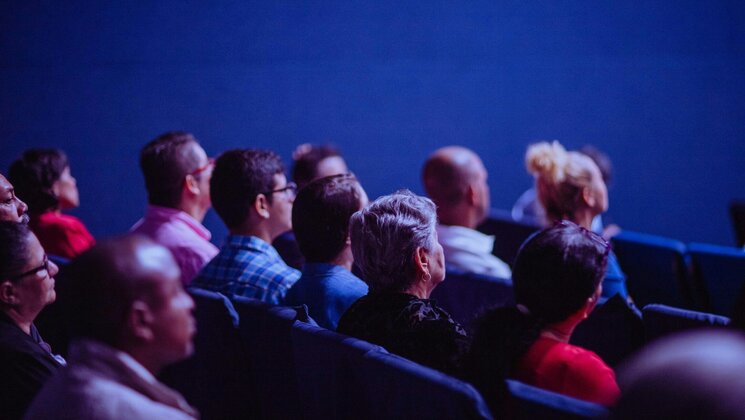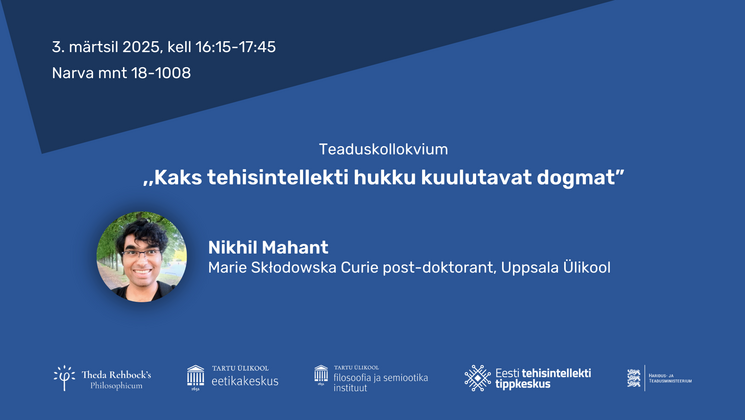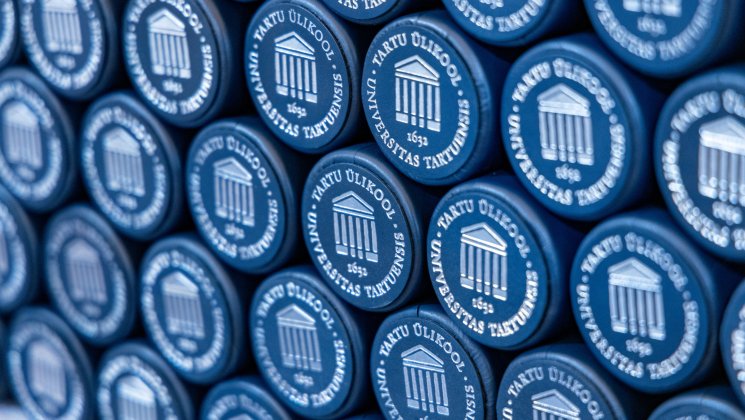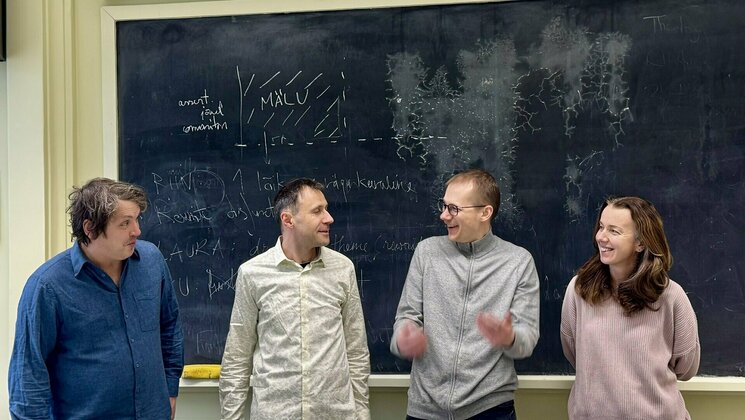-
Humanitaarteaduste ja kunstide valdkondHumanitaarteaduste ja kunstide valdkonna dekanaatJakobi 2, r 116-121 51005 Tartu linn, Tartu linn, Tartumaa EST0Ajaloo ja arheoloogia instituutJakobi 2 51005 Tartu linn, Tartu linn, Tartumaa EST0Eesti ja üldkeeleteaduse instituutJakobi 2, IV korrus 51005 Tartu linn, Tartu linn, Tartumaa EST0Filosoofia ja semiootika instituutJakobi 2, III korrus, ruumid 302-337 51005 Tartu linn, Tartu linn, Tartumaa EST0Kultuuriteaduste instituutÜlikooli 16 51003 Tartu linn, Tartu linn, Tartumaa EST0Maailma keelte ja kultuuride instituutLossi 3 51003 Tartu linn, Tartu linn, Tartumaa EST0UsuteaduskondÜlikooli 18 50090 Tartu linn, Tartu linn, Tartumaa EST0Viljandi kultuuriakadeemiaPosti 1 71004 Viljandi linn, Viljandimaa EST0Humanitaarteaduste ja kunstide valdkonna emeriitprofessorid0Humanitaarteaduste ja kunstide valdkonna emeriitdotsendid0Sotsiaalteaduste valdkondSotsiaalteaduste valdkonna dekanaatLossi 36 51003 Tartu linn, Tartu linn, Tartumaa EST0Haridusteaduste instituutJakobi 5 51005 Tartu linn, Tartu linn, Tartumaa EST0Johan Skytte poliitikauuringute instituutLossi 36, ruum 301 51003 Tartu linn, Tartu linn, Tartumaa EST0MajandusteaduskondNarva mnt 18 51009 Tartu linn, Tartu linn, Tartumaa EST0Psühholoogia instituutNäituse 2 50409 Tartu linn, Tartu linn, Tartumaa EST0ÕigusteaduskondNäituse 20 - 324 50409 Tartu linn, Tartu linn, Tartumaa EST0Ühiskonnateaduste instituutLossi 36 51003 Tartu linn, Tartu linn, Tartumaa EST0Narva kolledžRaekoja plats 2 20307 Narva linn, Ida-Virumaa EST0Pärnu kolledžRingi 35 80012 Pärnu linn, Pärnu linn, Pärnumaa EST0Sotsiaalteaduste valdkonna emeriitprofessorid0Sotsiaalteaduste valdkonna emeriitdotsendid0Meditsiiniteaduste valdkondMeditsiiniteaduste valdkonna dekanaatRavila 19 50411 Tartu linn, Tartu linn, Tartumaa ESTBio- ja siirdemeditsiini instituutBiomeedikum, Ravila 19 50411 Tartu linn, Tartu linn, Tartumaa ESTFarmaatsia instituutNooruse 1 50411 Tartu linn, Tartu linn, Tartumaa ESTHambaarstiteaduse instituutL. Puusepa 1a 50406 Tartu linn, Tartu linn, Tartumaa ESTKliinilise meditsiini instituutL. Puusepa 8 50406 Tartu linn, Tartu linn, Tartumaa ESTPeremeditsiini ja rahvatervishoiu instituutRavila 19 50411 Tartu linn, Tartu linn, Tartumaa ESTSporditeaduste ja füsioteraapia instituutUjula 4 51008 Tartu linn, Tartu linn, Tartumaa ESTMeditsiiniteaduste valdkonna emeriitprofessorid0Meditsiiniteaduste valdkonna emeriitdotsendid0Loodus- ja täppisteaduste valdkondLoodus- ja täppisteaduste valdkonna dekanaatVanemuise 46 - 208 51003 Tartu linn, Tartu linn, Tartumaa ESTArvutiteaduse instituutNarva mnt 18 51009 Tartu linn, Tartu linn, Tartumaa ESTGenoomika instituutRiia 23b/2 51010 Tartu linn, Tartu linn, Tartumaa ESTEesti mereinstituutMäealuse 14 12618 Tallinn, Harjumaa EST0Füüsika instituutKeemia instituutRavila 14a 50411 Tartu linn, Tartu linn, Tartumaa EST0Matemaatika ja statistika instituutNarva mnt 18 51009 Tartu linn, Tartu linn, Tartumaa EST0Molekulaar- ja rakubioloogia instituutRiia 23, 23b - 134 51010 Tartu linn, Tartu linn, Tartumaa ESTTartu observatooriumObservatooriumi 1 61602 Tõravere alevik, Nõo vald, Tartumaa EST0TehnoloogiainstituutNooruse 1 50411 Tartu linn, Tartu linn, Tartumaa ESTÖkoloogia ja maateaduste instituutJ. Liivi tn 2 50409 Tartu linn, Tartu linn, Tartumaa ESTLoodus- ja täppisteaduste valdkonna emeriitprofessorid0Loodus- ja täppisteaduste valdkonna emeriitdotsendid0Bioinseneeria instituutNooruse 1 50411 Tartu linn, Tartu linn, Tartumaa ESTAkadeemilise sekretäri tegevusvaldkondPersonaliosakondUppsala 6, Lossi 36 51003 Tartu linn, Tartu linn, Tartumaa EST0Finantsjuhi tegevusvaldkondRahandusosakondJakobi 4 51005 Tartu linn, Tartu linn, Tartumaa EST0Kantsleri tegevusvaldkondInfotehnoloogia osakondUppsala 10 51003 Tartu linn, Tartu linn, Tartumaa EST0KantseleiÜlikooli 17 (III korrus) 51005 Tartu linn, Tartu linn, Tartumaa EST0Kinnisvaraosakond0Turundus- ja kommunikatsiooniosakondÜlikooli 18, ruumid 102, 104, 209, 210 50090 Tartu linn, Tartu linn, Tartumaa EST0Rektori tegevusvaldkondRektoraadi bürooÜlikooli 18 50090 Tartu linn, Tartu linn, Tartumaa ESTSiseauditi bürooÕppeprorektori tegevusvaldkondÕppeosakondTeaduskoolUppsala 10 51003 Tartu linn, Tartu linn, Tartumaa EST0Üliõpilaskonna bürooÜlikooli 18b 51005 Tartu linn, Tartu linn, Tartumaa EST0Õppimis- ja õpetamiskeskusLossi 36-401 51003 Tartu linn, Tartu linn, Tartumaa ESTTeadusprorektori tegevusvaldkondTartu Ülikooli raamatukoguW. Struve 1 50091 Tartu linn, Tartu linn, Tartumaa EST0GrandikeskusRaekoja plats 9, III korrus 51004 Tartu linn, Tartu linn, Tartumaa ESTArendusprorektori tegevusvaldkondEttevõtlus- ja innovatsioonikeskusNarva mnt 18 51009 Tartu linn, Tartu linn, Tartumaa EST0Loodusmuuseum ja botaanikaaedVanemuise 46 51003 Tartu linn, Tartu linn, Tartumaa EST0Rahvusvahelise koostöö ja protokolli osakond0MuuseumLossi 25 51003 Tartu linn, Tartu linn, Tartumaa EST0
Kay O'Hallorani ja Donald Favareau loengud
Head semiootikasõbrad,
Ootame teid osalema Juri Lotmani ja Jakob von Uexkülli loengute sarjade paariskohtumisel 20. detsembril kell 14.15 Jakobi 2-336.
Ettekande peavad Kay O'Halloran (Liverpooli Ülikool) kultuurisemiootika väljakutsetest ja võimalustest ning Donald Favareau (Singapuri Riiklik Ülikool) biosemiootilisest üldisest intellektist.
Rõõmsa kohtumiseni!
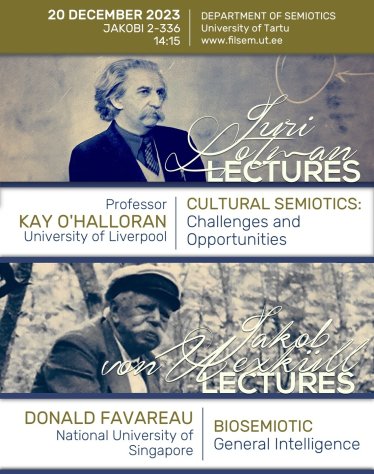
Kay O'Halloran: Cultural Semiotics: Challenges and Opportunities
In this talk, I explore the role of cultural semiotics today. Specifically, I examine the challenges arising from the power, knowledge, and wealth generated from semiotic data by the large technology companies. I will examine the recent developments in digital technology and AI, with a view to understanding the functions of the current digital ecosystem and the semiosphere which results. This includes discussion of how semiotic data is collected and analysed topredict and control human behaviour, resulting in the “unauthorised privatization of the division of learning in society today” (Zuboff, 2019: 192). As Zuboff further explains: “technology only contributes to shared prosperity when it is tamed by democratic rights, values, principles, and the laws that sustain them in our daily lives” (preface to Acemoglu & Johnson 2023). Within this context, I examine the role of cultural semiotics in shaping the future.
References:
Acemoglu, D & Johnson, S. (2023). Power and Progress: Our Thousand-Year Struggle Over Technology and Prosperity. London: Basic Books.
O’Halloran, K. L. (2023). Meaning, Matter and Semiotics. Visual Communication, 22(1). Special Issue: 20 Years of Visual Communication, edited by Louise Ravelli, Janina Wildfeuer et al.
Zuboff, S. (2019). The Age of Surveillance Capitalism: The Fight for a Human Future at the New Frontier of Power. New York: Public Affairs.
Don Favareau: Biosemiotic General Intelligence
After a brief period in which the early “machine learning” dream of eventually developing a human-like and even super-human-like, Artificial General Intelligence (AGI) was more or less put to rest, and subsumed by the development of more targeted and less ambitious computational and robotic technologies, with the global release of Generative Pre-Trained Transformer based software such as Chat GPT and DALL-E to the public “in 2023, everything changed” in the both the professional and in the public discourses surrounding Artificial Intelligence in general, and AGI in particular, as Audi Viidalepp reveals so cogently in her recent doctoral dissertation, The Expected AI as a Sociocultural Construct and its Impact on the Discourse on Technology (2023).
As Viidalepp shows, such discourse “is saturated with reified metaphors [of anthropomorphism and technological determinism] which drive connotations and delimit understandings of technology in society” (2023: 13). Too, along with reviving ancient fears, hopes and debates on the role of “technology” in the lives of human beings, the current discourse surrounding these technologies once again makes salient the foundational biosemiotic question of “How are we to understand the nature of an ‘intelligent’ system per se?” Is it the result of algorithmic computation and stochastic probability functioning? The “imprinting of meaning” via the creation of embodied and enacted “functional circles” in an otherwise unlabeled world? Or the navigation of co-ordinates within a cultural (or even natural) matrix of possibility, actuality and lawfulness, as described by Peircean triadic sign logic?
Such questions have always been, and remain, at the heart of the biosemiotic research agenda, and in this talk, I will take the opportunity to reflect a bit on the implications that a serious consideration of the biosemiotic perspective on organismic intelligence might bring to the current discourse surrounding the possibilities and perils of AI and AGI, as they are currently conceived.
References:
Favareau, Donald and Kull, Kalevi (in press). Conceptualizing the Role of Signs and Meanings in the Biosphere: Historical and Contemporary Perspectives. Pathways to the Origin and Evolution of Meanings in the Universe. Sharov. A., Gordon, R., Mikhailovsky, G. and Seckbach, J. (Eds). Austin: Scrivner.
Peirce, Charles Sanders. (1857-1914[1931-1935; 1958]). Collected Papers of Charles Sanders Peirce, Volumes 1-8. Harvard University Press, Cambridge, MA.
Uexküll, Jakob von. (1926 [1928]). Theoretical Biology. D.L. Mackinnon (trans). Kegan Paul, London.
Viidalepp, Auli. (2023). The Expected AI as a Sociocultural Construct and its Impact on the Discourse on Technology. Tartu: Tartu University Press.
Loe veel sarnaseid uudiseid



